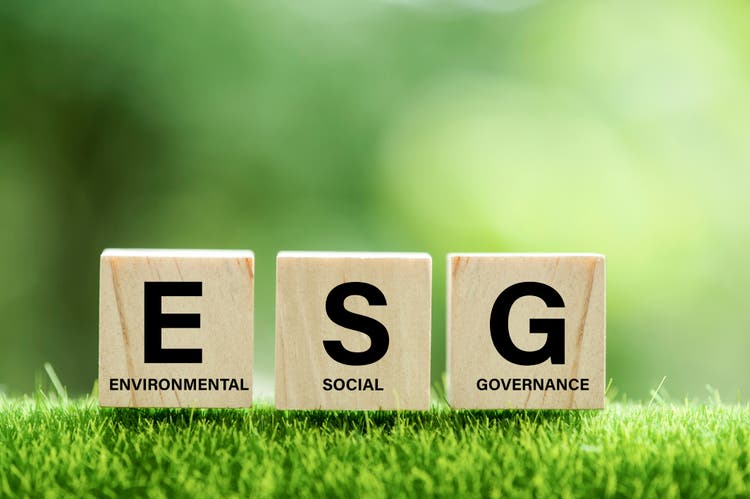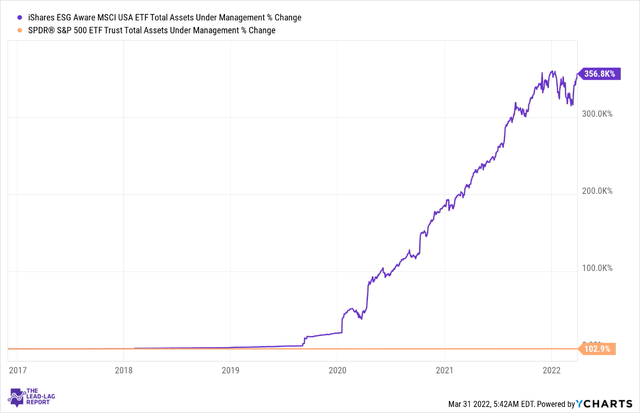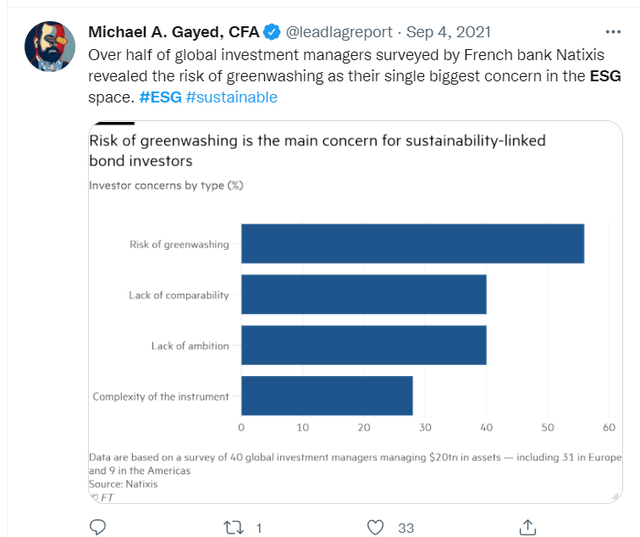Khanchit Khirisutchalual/iStock via Getty Images
“ESG is often a very good proxy for quality of management, which is critically important in a crisis. As we’ve seen over the last few months, businesses with high-quality leadership tend to place a greater importance on their role in society.” – Brunno Maradei
The iShares ESG Aware MSCI USA ETF (NASDAQ:ESGU) is a $25bn sized product covering large and mid-cap US stocks with favorable ESG ratings. Companies involved in the business of tobacco, defense, and fossil fuels are excluded whilst companies involved in “very severe business controversies” (as determined by MSCI) too are excluded.
Key themes
ESG (Environmental, Social, and Governance) themed investing has its skeptics (which I’ll touch on later), but you can’t disregard the fact that this is a magnet that has attracted an inordinate quantum of flows in recent years. Well, last year alone, global ESG ETFs garnered nearly $120bn in inflows, an impressive 51% annual growth over the previous year’s flows. Then, just to narrow down the focus to our ETF in question, note that since its inception in late 2016, ESGU’s AUM has expanded by 3.5x the level of the SPY which tracks the broader market. Remember that old catchphrase “follow the money”? As an influential, money-attracting theme, ESG is certainly at the vanguard of things.
ESG themed funds could continue to be in vogue for the foreseeable future and to understand this premise you need to consider the changing contours of those who will be participating in the markets. I’m referring specifically to the growing influence of the millennial class who have been the major proponents of sustainable investing over the last few years.
According to the Morgan Stanley Institute for Sustainable Investing, interest in sustainable investing amongst the general population of investors jumped from 71% in 2015 to 85% in 2019, whilst for millennial investors, this was already at 84% in 2015 and it hit 95% in 2019. A separate CNBC survey showed that 33% of millennials often or exclusively use ESG themed investments; for Gen Z, Gen X, and the baby boomers the proportion of interest was substantially lower. Now, in the years ahead, it looks like the millennial cohort could be poised to receive a substantial inheritance warchest from the baby boomers which MSCI estimates could be closer to $30 trillion! ESGU, one of the foremost names in the ESG space, backed by a venerable parent- Blackrock may prove to be one of the numero uno destinations for a large chunk of these flows.
Of course, ESG investing is not without its faults, and there’s a school of thought that believes it is more hype than substance. For instance, as noted in The Lead-Lag Report, I had flagged the risk of greenwashing as a growing theme of concern for investment managers. For the uninitiated, greenwashing is a nefarious phenomenon where organizations make false claims about environmentally-friendly processes or practices and falsely communicate this to investors. If this phenomenon picks up pace, investors could well lose patience and ESG could just remain a once-promising buzzword.
The other thing that one ought to consider is that financial advisors and agents are also incentivized to promote ESG investing simply because it is a more lucrative avenue. According to FactSet, ESG funds typically charge an average fee of 0.2% whilst other more standard baskets of stocks charge fees of 0.14%. So even though a certain fund may not have the necessary sustainable investing focus, it could be falsely promoted to garner pecuniary rewards for the stakeholders involved.
Then those who subscribe to The Lead-Lag Report would note that last year I had written a paywalled piece on ESG investing questioning whether it would lead to higher inflation over time. I referred to this as the “unintended costs of doing right by the world”. The question we need to ask is, does ESGU have a portfolio of stocks that can pass on these heightened costs to the end market, and for it to be accepted without much of a fuss. I believe ESGU has some fairly illustrious names in its portfolios, names that elicit fairly strong brand loyalty; I’m talking about the likes of Apple, Microsoft, Amazon, NVIDIA, JP Morgan, Tesla, etc.
Conclusion
As mentioned at the start of this article, ESGU has attracted plenty of flows from the investment world and its popularity is reflected in its valuations which are still quite cheap Currently this ETF trades at 22 P/E and the income component too is fairly underwhelming at around 1.16%. Also, note that tech stocks dominate the ESGU portfolio accounting for 27% of the holdings; as noted in The Lead-Lag Report, this sector has seen a slight bounce off late on account of the Russian-Ukraine conflict and cyber attacks but it may struggle to deliver outsized gains as the Fed continues to pivot to a hawkish environment.
 Anticipate Crashes, Corrections, and Bear Markets
Anticipate Crashes, Corrections, and Bear Markets
Sometimes, you might not realize your biggest portfolio risks until it’s too late.
That’s why it’s important to pay attention to the right market data, analysis, and insights on a daily basis. Being a passive investor puts you at unnecessary risk. When you stay informed on key signals and indicators, you’ll take control of your financial future.
My award-winning market research gives you everything you need to know each day, so you can be ready to act when it matters most.
Click here to gain access and try the Lead-Lag Report FREE for 14 days.




Be the first to comment